Related Research Articles
An audio file format is a file format for storing digital audio data on a computer system. The bit layout of the audio data is called the audio coding format and can be uncompressed, or compressed to reduce the file size, often using lossy compression. The data can be a raw bitstream in an audio coding format, but it is usually embedded in a container format or an audio data format with defined storage layer.
Windows Media Audio (WMA) is a series of audio codecs and their corresponding audio coding formats developed by Microsoft. It is a proprietary technology that forms part of the Windows Media framework. WMA consists of four distinct codecs. The original WMA codec, known simply as WMA, was conceived as a competitor to the popular MP3 and RealAudio codecs. WMA Pro, a newer and more advanced codec, supports multichannel and high resolution audio. A lossless codec, WMA Lossless, compresses audio data without loss of audio fidelity. WMA Voice, targeted at voice content, applies compression using a range of low bit rates. Microsoft has also developed a digital container format called Advanced Systems Format to store audio encoded by WMA.
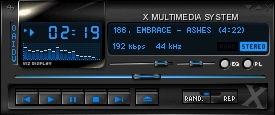
X Multimedia System (XMMS) is an audio player for Unix-like systems released under a free software license.

FLAC is an audio coding format for lossless compression of digital audio, developed by the Xiph.Org Foundation, and is also the name of the free software project producing the FLAC tools, the reference software package that includes a codec implementation. Digital audio compressed by FLAC's algorithm can typically be reduced to between 50 and 70 percent of its original size and decompresses to an identical copy of the original audio data.
Monkey's Audio is an algorithm and file format for lossless audio data compression. Lossless data compression does not discard data during the process of encoding, unlike lossy compression methods such as Advanced Audio Coding, MP3, Vorbis, and Opus. Therefore, it may be decompressed to a file that is identical to the source material.
The Apple Lossless Audio Codec (ALAC), also known as Apple Lossless, or Apple Lossless Encoder (ALE), is an audio coding format, and its reference audio codec implementation, developed by Apple Inc. for lossless data compression of digital music. After initially keeping it proprietary from its inception in 2004, in late 2011 Apple made the codec available open source and royalty-free. Traditionally, Apple has referred to the codec as Apple Lossless, though more recently it has begun to use the abbreviated term ALAC when referring to the codec.
WavPack is a free and open-source lossless audio compression format and application implementing the format. It is unique in the way that it supports hybrid audio compression alongside normal compression which is similar to how FLAC works. It also supports compressing a wide variety of lossless formats, including various variants of PCM and also DSD as used in SACDs, together with its support for surround audio.

Rockbox is a free and open-source software replacement for the OEM firmware in various forms of digital audio players (DAPs) with an original kernel. It offers an alternative to the player's operating system, in many cases without removing the original firmware, which provides a plug-in architecture for adding various enhancements and functions. Enhancements include personal digital assistant (PDA) functions, applications, utilities, and games. Rockbox can also retrofit video playback functions on players first released in mid-2000. Rockbox includes a voice-driven user-interface suitable for operation by visually impaired users.
libavcodec is a free and open-source library of codecs for encoding and decoding video and audio data.
The following tables compare general and technical information for a variety of audio coding formats.

Audacious is a free and open-source audio player software with a focus on low resource use, high audio quality, and support for a wide range of audio formats. It is designed primarily for use on POSIX-compatible Unix-like operating systems, with limited support for Microsoft Windows. Audacious was the default audio player in Ubuntu Studio in 2011–12, and was the default music player in Lubuntu until October 2018, when it was replaced with VLC.
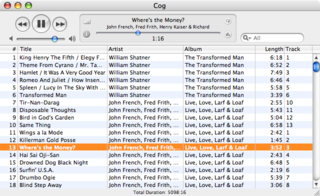
Cog is an open source audio player for macOS. The basic layout is a single-paned playlist interface with two retractable drawers, one for navigating the user's music folders and another for viewing audio file properties, like bitrate. Along with supporting most audio formats compatible with macOS's Core Audio API, Cog supports a wide array of other audio formats, along with their metadata, which are otherwise unsupported on macOS.
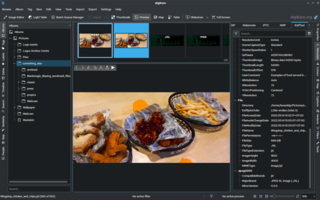
A tag editor is an app that can add, edit, or remove embedded metadata on multimedia file formats. Content creators, such as musicians, photographers, podcasters, and video producers, may need to properly label and manage their creations, adding such details as title, creator, date of creation, and copyright notice.
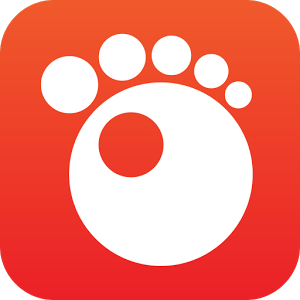
GOM Player is a media player for Windows, developed by GOM & Company. With more than 100 million downloads, it is also known as the most used player in South Korea. Its main features include the ability to play some broken media files and find missing codecs using a codec finder service.
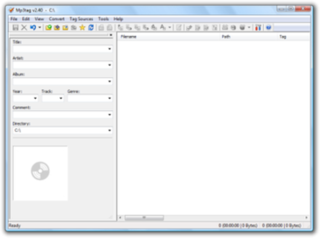
Mp3tag is a metadata tag editor that supports many popular audio file formats. It is freeware for Microsoft Windows, while it costs USD $19.99 for Apple macOS in the Mac App Store.

Simplified Universal Player Encoder & Recorder (SUPER) is a closed-source front end for open-source software video players and encoders provided by the FFmpeg, MEncoder, MPlayer, x264, ffmpeg2theora, musepack, Monkey's Audio, True Audio, WavPack, libavcodec, and the Theora/Vorbis RealProducer plugIn projects. It was first released in 2005. SUPER provides a graphical user interface to these back-end programs, which use a command-line interface.
MPEG-1 Audio Layer III HD was an audio compression codec developed by Technicolor, formerly known as Thomson.

An audio coding format is a content representation format for storage or transmission of digital audio. Examples of audio coding formats include MP3, AAC, Vorbis, FLAC, and Opus. A specific software or hardware implementation capable of audio compression and decompression to/from a specific audio coding format is called an audio codec; an example of an audio codec is LAME, which is one of several different codecs which implements encoding and decoding audio in the MP3 audio coding format in software.
References
- ↑ "SHORTEN SOFTWARE LICENSE". Archived from the original on 2017-08-16. Retrieved 2020-10-16.
- ↑ "[shorten]". Archived from the original on 2018-09-08. Retrieved 2020-10-16.